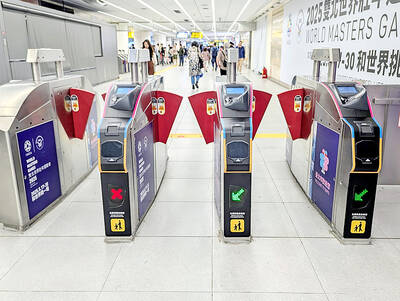The Chinese Nationalist Party (KMT) is confronted with an unprecedented challenge in next year’s legislative elections, particularly in central and southern Taiwan, according to party sources.
The KMT would find it difficult to nominate legislative candidates for the six perceived “difficult” districts in central and southern Taiwan, including districts in Yunlin, Chiayi and Pingtung, KMT sources said party members who declined to be named.
The grim picture is a result of the KMT government’s perceived poor performance, as well as the low popularity of its presidential candidate Hung Hsiu-Chu (洪秀柱), adding that these factors, combined with rumors of defections by KMT politicians demoralized KMT grassroots supporters, the sources said.
Central and southern Taiwan are the traditional strongholds of the Democratic Progressive Party (DPP) and the few KMT politicians in office are at risk of losing their seats, according to KMT members involved in the campaign, adding that the party now worries that the pan-green camp would try to expand its dominance of central Taiwan.
Although the KMT is traditionally the stronger force in the north, multiple districts are now at risk, party sources said.
The KMT also anticipates a more challenging election year in northern Taiwan compared with the 2012 election, and has already tasked local organizations and activists with warding off members who plan to abandon their party affiliation, according to sources in the pan-blue camp.
However, one party member expressed skepticism about the notion that more KMT candidates would abandon ship.
“Do they really think they would have an easier time running without their party membership?” the anonymous party member said, adding that leaving the KMT would be useless because next year’s elections would still be the traditional showdown between the pan-blue and the pan-green camps.
According to party sources, the KMT has not decided whom to nominate in the six problematic electoral districts that include the second electoral district of Yunlin County, the first and second electoral districts of Chiayi County and Chiayi City, and the first and third electoral districts of Pingtung County.
The KMT should come up with a coherent strategy for its pick of candidates for Yunlin and Chiayi electoral districts, party sources said.
The KMT had previously selected independent candidate and surgeon Weng Shou-liang (翁壽良) to represent it in Chiayi City, but the decision was met with strong resistance from inside the party, and it might instead put legislator-at-large Wu Yu-ren (吳育仁) on the ballot card, according to KMT sources.
For Chiayi County, the KMT is considering the nomination of Lin Chiang-Chuan (林江釧), who is the son of Dongshi Township (東石) Mayor Lin Chun-Chin (林純金), for the first district, while County Councilor Lin Yu-ling (林于玲) is being considered for the second district, party sources said.
All 73 district legislator seats, six Aboriginal district representatives and 34 legislator-at-large seats are to be selected in next year’s Jan. 16 elections.
In related news, an assessment conducted by the DPP suggested that the DPP is on track to win a legislative majority, taking 57 seats out of a total of 113, including district legislators and legislators-at-large, while the number of KMT legislators elected would drop to about 40.
Additional reporting by Tzou Jiing-wen

A magnitude 6.4 earthquake struck off the coast of Hualien County in eastern Taiwan at 7pm yesterday, the Central Weather Administration (CWA) said. The epicenter of the temblor was at sea, about 69.9km south of Hualien County Hall, at a depth of 30.9km, it said. There were no immediate reports of damage resulting from the quake. The earthquake’s intensity, which gauges the actual effect of a temblor, was highest in Taitung County’s Changbin Township (長濱), where it measured 5 on Taiwan’s seven-tier intensity scale. The quake also measured an intensity of 4 in Hualien, Nantou, Chiayi, Yunlin, Changhua and Miaoli counties, as well as

Credit departments of farmers’ and fishers’ associations blocked a total of more than NT$180 million (US$6.01 million) from being lost to scams last year, National Police Agency (NPA) data showed. The Agricultural Finance Agency (AFA) said last week that staff of farmers’ and fishers’ associations’ credit departments are required to implement fraud prevention measures when they serve clients at the counter. They would ask clients about personal financial management activities whenever they suspect there might be a fraud situation, and would immediately report the incident to local authorities, which would send police officers to the site to help, it said. NPA data showed

ENERGY RESILIENCE: Although Alaska is open for investments, Taiwan is sourcing its gas from the Middle East, and the sea routes carry risks, Ho Cheng-hui said US government officials’ high-profile reception of a Taiwanese representative at the Alaska Sustainable Energy Conference indicated the emergence of an Indo-Pacific energy resilience alliance, an academic said. Presidential Office Secretary-General Pan Men-an (潘孟安) attended the conference in Alaska on Thursday last week at the invitation of the US government. Pan visited oil and gas facilities with senior US officials, including US Secretary of the Interior Doug Burgum, US Secretary of Energy Chris Wright, Alaska Governor Mike Dunleavy and US Senator Daniel Sullivan. Pan attending the conference on behalf of President William Lai (賴清德) shows a significant elevation in diplomatic representation,

The Taipei MRT is to begin accepting mobile payment services in the fall, Taipei Rapid Transit Corp said on Saturday. When the company finishes the installation of new payment units at ticketing gates in October, MRT passengers can use credit cards, Apple Pay, Google Pay and Samsung Pay, the operator said. In addition, the MRT would also provide QR payment codes — which would be compatible with Line Pay, Jkopay, iPass Money, PXPay Plus, EasyWallet, iCash Pay, Taiwan Pay and Taishin Pay — to access the railway system. Currently, passengers can access the Taipei MRT by buying a single-journey token or using EasyCard,